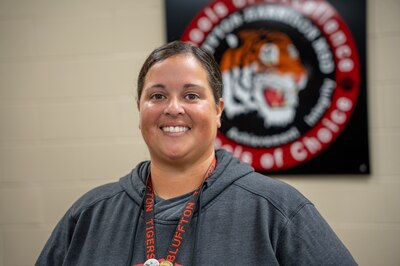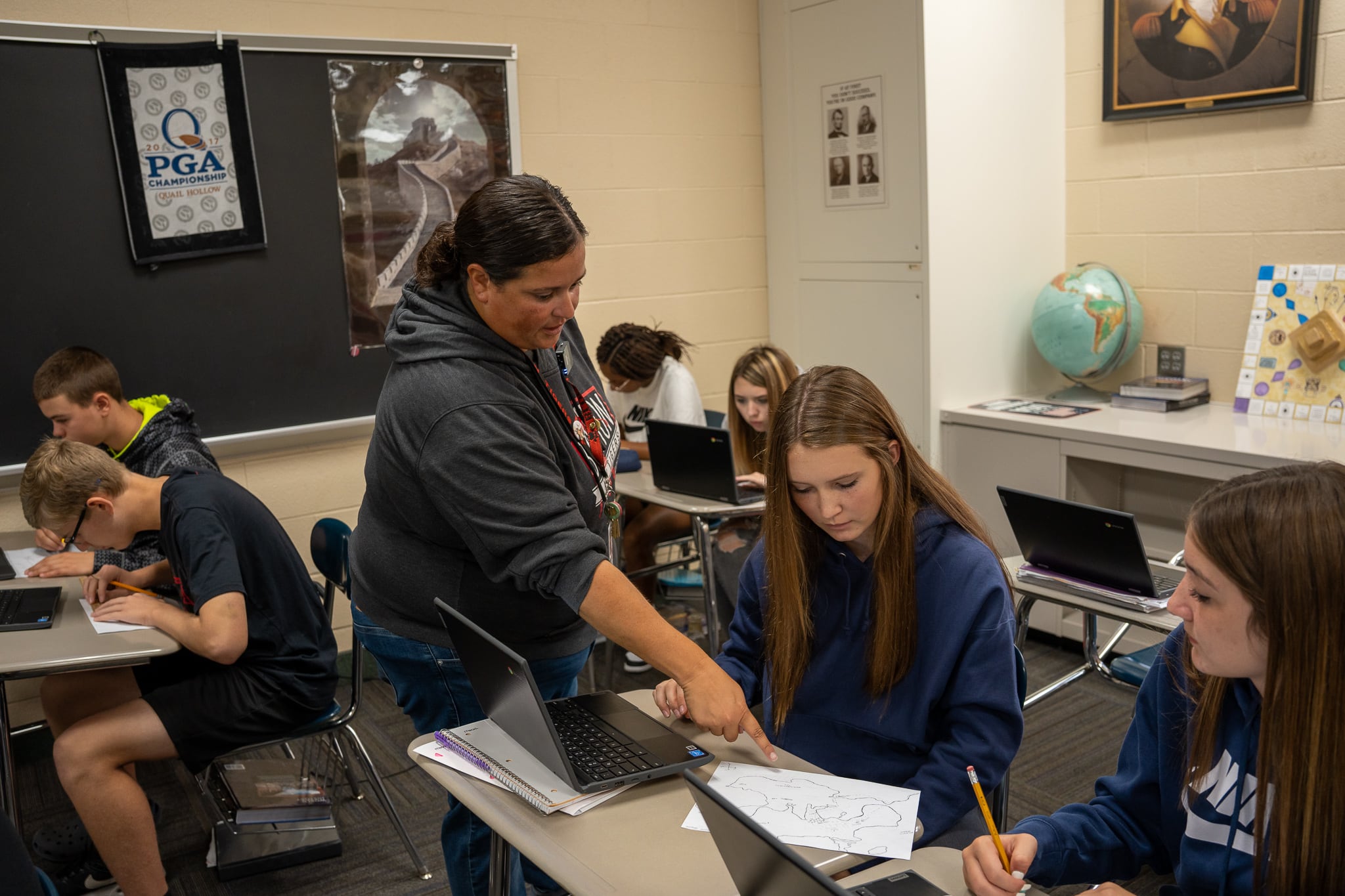To Tara Cocanower, her students are “world changers.”
“I want them to know I see them as people who can make a difference in the world and be a change for good,” said Cocanower, a world history teacher at Bluffton High School. “What’s the point in learning about the world if you’re not going to be an active participant in it?”
Every day, Cocanower said her students cheer her on and support her like she does for them.
“They’ve changed my world for the better,” she said.
Drawn to education as a way to make an impact on her community, Cocanower has taught at Bluffton High in her hometown just south of Fort Wayne, for nine years. She teaches world history, AP world history, and principles of teaching.
In October, she was named the 2023 Indiana Teacher of the Year. Cocanower talked to Chalkbeat Indiana about how she brings the world and the community into her classroom, her statewide honor, and advice from Grandma Phyllis.
This interview has been lightly edited for length and clarity.
How and when did you decide to become a teacher? Did you always want to teach in your hometown?
I didn’t think about pursuing education as a career until my sophomore year of college. I interned for an awesome eighth grade history teacher and cadet taught for my former first grade teacher during my senior year of high school, but I only did that to fill time in my schedule. People always told me I’d be a good teacher, but I didn’t think teaching was prestigious enough, lucrative enough, etc. I wanted to go into law, pursue the foreign service, or a Ph.D. in History. In college, I had a professor who showed me that teaching could be a calling and a profession full of purpose. That changed my trajectory. When I finished my time in Romania after my Peace Corps service, I prayed about where I should go next. Ultimately, my grandparents played a major role in me returning to Bluffton. I want to live a legacy of service and matter to our community the way that they did.

Congratulations on being the state’s teacher of the year for 2023. What does that award mean to you? How do you hope to use it?
To me, this award is affirmation of who I try to be and how I teach/coach. I’m not even the best teacher that I know, but I’m a good one and I’m honored to be given an opportunity to represent the amazing educators we have in Indiana. I hope to use this platform to promote civics education and social studies literacy. I want to empower and support other history teachers, and all teachers really, during these divisive times. I’d also like to support education-based athletics; as a three-sport athlete in high school, a collegiate golfer, and as a coach of two sports (golf and track and field), I know the value extracurricular activities have both inside and outside the classroom.
What’s your favorite lesson to teach and why?
Honestly, I think it changes depending on the personality of individual classes. When I taught middle school I would have said lessons on the decolonization of Africa, refugee camps throughout the world, or ancient Egypt. Now, as a high school teacher, I really enjoy teaching World War I. It encompasses so many different narratives globally that I think are valuable today. I also love discussing the technology of the time period and implementing some edtech into our lessons such as Sphero, digital Breakout Edu activities, and problem-based learning.
What’s something happening in the community that affects what goes on inside your classroom?
In Bluffton, we have an organization called Forgotten Children Worldwide, or FCW, which works to protect children from poverty and human trafficking around the world. It was started by a friend of mine, and I try to support it in any way I can. Currently, I’m partnering with them to develop an educational activity about India. The founder of FCW is going to be traveling around India in a tuk tuk [a three-wheel vehicle] and documenting it; and we are currently trying to create an accessible curriculum for teachers and other organizations. We also are blessed at Bluffton to have welcomed several exchange students as well as Ukrainians who have been displaced by the war in their country. Our worlds have been brought together, and there is no better resource for me as a world history teacher than perspectives from other countries.
How do you approach news events in your classroom?
Carefully. In my 13 years of teaching, it’s only gotten harder to navigate using current events, but I can’t shy away from them and still believe I’m serving students well.
I’d say I approach news events as a facilitator of information. News events bring about the best discussions, and reflecting on them reminds me of several times tears have been shed because our hearts were broken over tragedies in our nation and world. I try to diversify the media outlets students choose to gain information from, and we do a lot of work developing historical reading skills to prepare for researching. We try to corroborate different sources, and then I encourage them to form their personal opinions supported by evidence. They know they’re allowed to disagree with one another.
I work hard to model civil discourse through Socratic seminars, historical text analysis, etc. My opinion doesn’t really matter within the walls of my classroom, and it’s always a compliment when students aren’t able to easily identify my personal bias or point of view.
Finally, I always try to share ways students can get involved to make an impact or encourage them to take the conversation we started home to their families. It’s a privilege to partner with parents, and I love hearing that what I’m teaching overflows from the classroom to the dinner tables, couches, and patios of my students.
What’s the best advice you’ve ever received, and how have you put it into practice?
The best advice I’ve ever received was from my Grandma Phyllis. As a kid, I could sometimes be a little proud and arrogant in showing off my accomplishments. Without fail, every time, she would tell me “I’ll tell you; you don’t tell me.” To me, that means that the reward was in doing it — not for the praise I gained for it. The Bible recounts this many times, but for me, Matthew 6:1-2 has always been what I think about.
I don’t teach for awards, money, or fame; I teach because kids matter and I believe that serving others is the greatest thing you can do with your time. Social media has only made things worse. Many of us share our highlight reels with the world and we base our identity and worth on how many likes we receive. As a high school teacher, I have a front-row seat to the damage this is doing to our youth.
I try to celebrate and affirm my students’ accomplishments as much as possible, but I encourage them to do whatever it is because it’s the right thing to do — not because they’ll be praised for it or get a trophy for it.
What are you reading right now?
“The Splendid and the Vile” by Erik Larson.
I want my students to know that I don’t know everything and to be a reader is a superpower. During the school year, I mostly read nonfiction that supports my lessons and challenges me to keep learning.
MJ Slaby is the bureau chief for Chalkbeat Indiana. Contact MJ at mslaby@chalkbeat.org.







